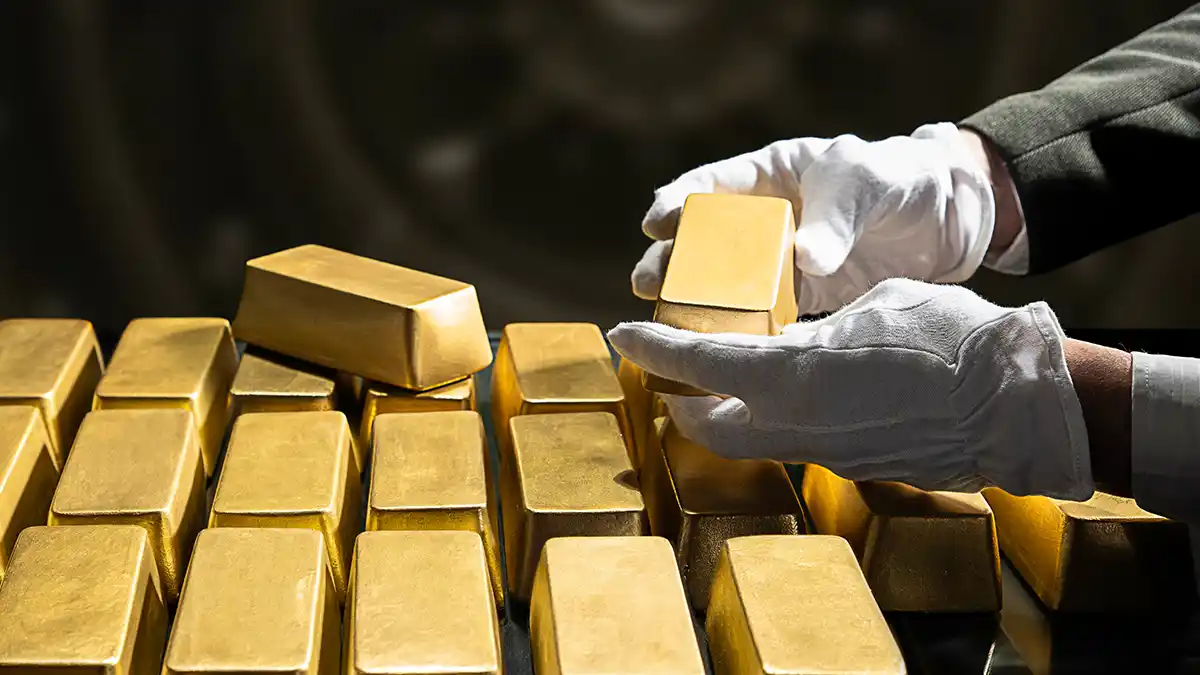Central banks all over the world purchase gold as a means to diversify their reserves. But in 2025, central banks are buying gold at an unprecedented rate to diversify their reserves away from the US dollar, build a hedge against inflation and acquire a sanctions-proof asset, especially during times of global economic and geopolitical turmoil.
In this blog, we will delve deeper into the understanding of why central banks all over the world, including the Reserve Bank of India (RBI), are buying gold and uncover the key drivers behind this historic shift.

Uncovering the Global Gold Rush
According to JP Morgan research forecasts cited in an EBC Financial Group report, global central bank gold purchases are set to surpass 900 tonnes in 2025, marking a fourth consecutive year of aggressively buying gold. As per reports, the Reserve Bank of India has also added 600kg to its gold reserves this fiscal year and already surpassed the 880-tonne mark.
Reuters reported that global central banks now hold more than 35,000 metric tonnes of yellow metal, which is about one-fifth of all the gold ever mined. For the first time since 1996, central banks worldwide now hold more gold in their reserves than U.S. government bonds, signalling a significant transformation in global reserve management strategies.
Here is the amount of gold purchased in the past few years:
|
Year |
Central Bank Purchase |
|
2022 |
1,082 tonnes |
|
2023 |
1,037 tonnes |
|
2024 |
1,180 tonnes |
|
2025 |
244 tonnes in
Q1 |
Key Reasons Why Central Banks Are Buying Gold
Here are the primary reasons driving the global gold rush of central banks over the last few years:
Diversification from the US Dollar
The rising US national debt and increasing political divisions have led to central banks revising their monetary policies that are less reliant on the US dollar. This is one of the primary drivers behind the ongoing gold rush, where a bank’s gold reserve can act as a buffer against any risk arising due to holding too much of US debt.
Protection Against Sanctions
Unlike conventional currencies, gold is a physical asset that has an intrinsic and global value. This means that the value of gold cannot be frozen or blocked like conventional currencies through sanctions. Further, being a finite resource and independent from any central authority makes gold immune to international financial sanctions.
Hedge Against Inflation
Gold serves as a reliable store of value during periods of currency depreciation, such as inflation. While central banks regulate their national currencies, the value of such conventional currencies fluctuates depending on various factors. Simply printing more money during times of need devalues the currency. On the contrary, gold, being a limited physical commodity, its global supply cannot be increased at will. Therefore, gold reserves serve as a natural hedge against inflation.
Economic Turmoil and Geopolitical Uncertainty
For centuries, gold has been perceived as a safe-haven asset by investors and central banks alike. During economic instability and global geopolitical uncertainties like wars, degrading diplomatic relations, economic collapse, etc., central banks shift to gold as a more reliable instrument compared to conventional markets. The ongoing global tensions, such as the Russia-Ukraine war, the change of the Japanese government, etc., can be perceived as major global economic and geopolitical uncertainties leading to central banks revising their monetary policies and buying gold aggressively.
Reducing Dollar Reliance
In a measure to reduce accumulating US debt and other global economic shifts, central banks are now more inclined to diversify their reserves away from US Treasuries. Gold, as a safe-haven asset with immunity to devaluation, provides a way to build a diverse financial system for central banks. This is yet another reason why global central banks are turning their focus to increasing their gold reserves.
Also Read: Why is Gold Price Increasing in India?
To Conclude
Central banks all around the world, including the Reserve Bank of India, are aggressively adding to their gold reserves in a bid to diversify from the US dollar, building a hedge against inflation and building a reserve that is immune to sanctions. Despite the consistent rise in gold prices, central banks have continued buying gold for at least three to four years, reasserting the timeless value of gold.
Even as an individual, gold can serve as a safe haven asset for you, as its value can be easily monetised with a Gold Loan and access funds during times of financial turmoil. With Poonawalla Fincorp, you can get a high loan amount of up to ₹50 lakhs against your gold while still retaining complete ownership. Explore more benefits on the official website and avail now.
Frequently Asked Questions
Why are central banks buying so much gold in 2025?
Central banks are buying gold at record levels amid geopolitical tensions, ongoing inflation, and doubts about the reliability of traditional reserve assets such as US Treasury bonds. Gold’s status as a safe-haven asset with no counterparty risk makes it especially appealing during periods of uncertainty.
Is this gold buying linked to de-dollarisation?
Yes. Many emerging economies are using gold to diversify away from the U.S. dollar. This is part of a broader de-dollarisation strategy, especially after Western sanctions on countries like Russia highlighted the risks of holding dollar-denominated assets.
Why is gold considered safer than other reserve assets?
Gold is independent of any country’s monetary policy, cannot default, and is unaffected by sanctions or inflation. Unlike fiat currencies or bonds, it is a tangible asset with intrinsic value and no counterparty risk.
We take utmost care to provide information based on internal data and reliable sources. However, this article and associated web pages provide generic information for reference purposes only. Readers must make an informed decision by reviewing the products offered and the terms and conditions. Loan disbursal is at the sole discretion of Poonawalla Fincorp.
*Terms and Conditions apply